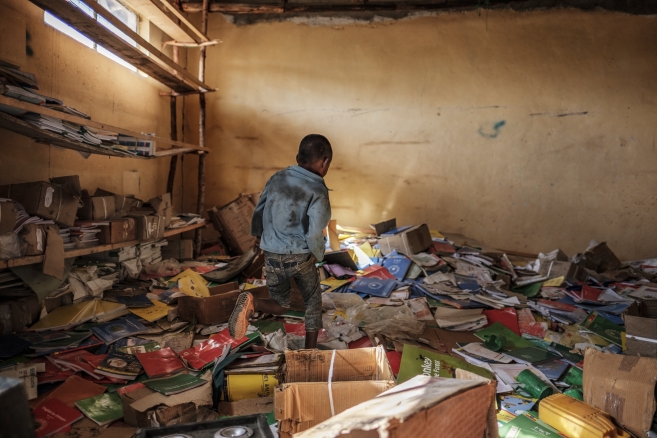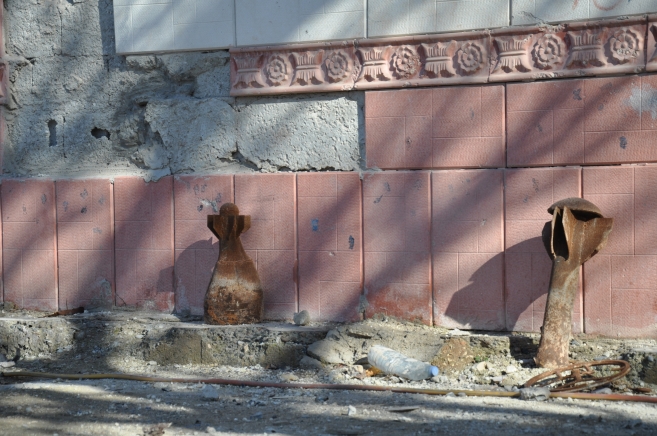This week marks ten years since INEW was founded by a group of NGOs calling for immediate action to prevent human suffering from the use of explosive weapons in populated areas. While we have accomplished a huge amount over the last decade in collaboration with other partners, celebration does not feel appropriate when so many civilians continue to suffer the use of explosive weapons, and there is so much more to be done.

A child walks among books in the library of a former elementary school that was damaged during the fighting that broke out in Ethiopia’s Tigray region, in the village of Bisober, on December 9, 2020. Tigrayan forces settled in the school 7 months before the beginning of the conflict, using it as a military base. © MSF
Since its inception, INEW members have been documenting the devastating impact of explosive weapons on civilian populations. This has established a clear and well-documented pattern of harm as a result of such use, including death, physical and psychological injury, a disastrous erosion of public health, forced displacement, among other impacts from the destruction of vital infrastructure and services that are often located in urban areas.
Airstrikes, rocket attacks, and heavy artillery continue to kill, injure and traumatise tens of thousands every year in the neighbourhoods where they live and work. The precise number of casualties may fluctuate, but the pattern remains the same: when explosive weapons are used in populated areas, around 90% of those directly killed or injured are civilians. Buildings are reduced to rubble, and power, water and sanitation infrastructure is destroyed, shutting down essential services upon which the population depends — not least health care and education.
The devastating impact of explosive weapons does not end there: food supplies are disrupted, communities and areas contaminated with explosive remnants of war are rendered unsafe, and homes uninhabitable. People flee, seeking comparative safety elsewhere.
Explosive weapons that have wide area effects are of particular concern due to the high likelihood of civilian harm. Weapon systems prone to wide area effects have been designed for use in open battlefields and are therefore wholly unsuited for use in towns, cities and other populated areas where they cause staggering devastation.
INEW is not alone in finding the bombing of towns and cities abhorrent and unacceptable: successive UN Secretaries-General, the International Committee of the Red Cross (ICRC), and a growing number of states have acknowledged the grave human costs of using explosive weapons in populated areas, as well as the urgent need to address it.
This year, under the leadership of Ireland, states are expected to conclude negotiations on a political declaration on explosive weapons.

Mortar remnants of war amid the rubble, Kobane, January 23, 2017. © MSF
An effective political declaration with humanitarian purpose will signal meaningful action to curb civilian suffering from conflict. Whilst not a legally binding commitment, a strong political declaration will influence the behaviour of states by promoting a clear international standard of practice, as well as provide a tool that promotes operational policy and practice to better protect civilians, and a framework for states to work together to achieve that purpose.
This is why, as INEW turns ten, we again call on states to urgently adopt and implement a strong declaration that addresses this clear and documented pattern of harm by committing states to avoiding use of explosive weapons in populated areas and assisting affected people and communities.
